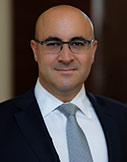Experts
Aram Nerguizian

Former Senior Advisor, Program on Civil-Military Relations in Arab States, Malcolm H. Kerr Carnegie Middle East Center
About
Aram Nerguizian was senior advisor of the Program on Civil-Military Relations in Arab States at the Malcolm H. Kerr Carnegie Middle East Center, where his work focuses on the Lebanese security sector, long-term force transformation in the Levant, and efforts to develop national security institutions in post-conflict and divided societies.
Nerguizian is the chief executive officer of The Mortons Group, a strategy consulting firm that provides tailored solutions in civil-military planning, strategic planning support, and geopolitical risk assessments. He has also served as a senior fellow and principal subject matter expert on military and asymmetric forces in the Levant at the Center for Strategic and International Studies. He is the leading authority on the Lebanese armed forces and advises civil-military leadership within bilateral and multilateral efforts tied to Lebanon. He holds degrees in international affairs, political science, and business administration, and has received security assistance management training from the Defense Institute of Security Cooperation Studies.
Nerguizian is the author of numerous publications, including most recently: The Lebanese Armed Forces, Hezbollah, and Military Legitimacy (2017), The Military Balance in a Shattered Levant (2015), Between Sectarianism and Military Development: The Paradox of the Lebanese Armed Forces (2015), The Struggle for the Levant: Geopolitical Battles and the Quest for Stability (2014), and U.S-Iranian Competition in the Levant (2013). His books on Israeli-Syrian military balance and force developments in the Maghreb appeared in 2008 and 2009.
Areas of Expertise
Education
Global Executive MBA, Georgetown University and Escola Superior d'Administració i Direcció d'Empreses (ESADE) Business School, MA, International Affairs, George Washington University, BA, Political Science, Concordia University
Languages
Arabic, English, French